Health and Fitness Series Dr. Kallie  I'm going to bring this topic to you and I sincerely ask that you take a moment to read through it. I know a lot of people are quick to close the book, so-to-speak, when the topic of obesity comes up. Either they think they don't fall into the category, or they don't want to admit to being among those in the category. It's not a fun topic, and surely it is not fun to take ownership of it, but there is a lot more to just the label of obesity. It's the realization that as a society we are REALLY struggling with the ramifications of poor eating habits and lack of exercise from toddlers to the elderly. The personal reason I decided to write about this today was because of a turning point in my life to work hard and make changes for me and our community. About 5 years ago, my family was sitting at an outdoor event here in Northern Michigan and the magnitude of our sinking health status really struck me. I am a people watcher, I LOVE watching people for hours on end. While watching people at this particular venue, I was astonished by the number of overweight people walking around. Seriously, it was hard to find enough fit people to count on one hand. It truly hurt my heart, and I told my husband that very day that I was going work as hard as I could to get into great shape and try to be an inspiration and teacher for as many people as I could. The moment was pretty significant, because I can tell you almost every detail of that day, nearly 5 years ago. As I have said earlier, this is my way of giving back to help others. Bringing you the obesity topic, is not just for you the reader, but also for you as the parent, caregiver, teacher, counselor, employer, etc. The obesity epidemic is very real and rapidly growing, sadly even among our children. The children, in my opinion, need the most help. The eating habits, lack of activity, and physiological damage done as such a young age is so very scary and much more difficult to change. Definition of obesity: The national Institutes of Health tells us that obesity is having a BMI (body mass index) of 30 or above. A BMI between 25.0 - less than 30 is considered overweight. Class 1 : BMI 30-34.9 Class 2: BMI 35-39.9 Class 3: BMI of 40+. Class 3 is considered extreme or severe. According to the CDC, children and adolescents age 2-20 year of age, a BMI in the 85th-94th percentile for age and gender is considered overweight; a BMI in the 95th percentile or above is considered obese. Facts: United States Map of Obese Percentage is Adults 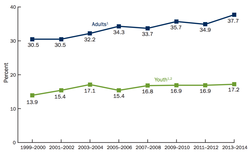 The line graph above clearly shows the increase in obesity over the last several years in not only adults but children also. Currently we are looking at almost 38 percent of our population falling into the obese category. Please note, this is the OBESE category, not the over weight category. According to the 2017 Youth Risk Behavior System, 14.8% of high school students were obese, and an additional 15.6% were overweight. From 2011-2014, middle-aged Americans (ages 40-59) had the highest obesity rate at 41.0%, followed by seniors (ages 60+) at 38.5%, and then young adults (ages 20-39) at 34.3%. The scariest of information I came across was that research stating that the youth ages 2-5 had the most significant weight gain percentage. Obesity rates in this group rose to 13.9% in 2015 and 2016 from10.1% in 2007 and 2008. Below is a very similar line graph produced by Forbes recently. The article mentioned that we are currently at a point in society where there are more obese people than those suffering from hunger/starvation. It's not rocket science to tell you what causes obesity, especially if you've been reading my posts. We are literally eating ourselves into a premature death. Obesity is not just being overweight, and unable to perform daily tasks easily. It is the gateway into suffering from MANY different aliments. To name a few, obesity is a contributing factor to heart disease, diabetes II, some cancers, reproduction problems, chronic back pain, strokes, asthma, sleep apnea, osteoarthritis, metabolic syndrome, gallbladder diseases, fatty liver diseases, kidney diseases, and hypertension. Eat too many calories + decrease physical activity = weight gain The major contributing factor to this epidemic is they change in the way we eat. I hear the argument that we eat so much LESS FAT today than our grandparents and great grandparents since they used to cook with pure lard, and literally eat the fat on a side of beef, but remember that those wonderful relatives also worked their tailfeathers off in labor intensive jobs. Plus their foods were whole foods, none of the processed crap that you stop at the gas station for during the break at your desk job. Today there is a fast food joint on nearly every busy intersection. The number of restaurants, gas stations, and vending machines have skyrocketed. Those places don't carry much of any fruits or veggies simply because they would lose money if those things perished. The money makers are foods that can sit on the shelves for weeks on end, full of preservatives and other countless chemicals. I would be lying to you if I told you I didn't like to go out to a nice restaurant for dinner now and then, I think we all do. If you decrease the amount you eat out, you become aware very quickly of how much the restaurants use yummy butter, salt, and sugars on all of those tasty dishes. They taste incredible, but they can also add to you daily calories very quickly. Those daily caloric increases from eating out then quickly add up into pounds of body fat. Suddenly you've put on 10-15lbs in the last 6 months, and working out becomes too uncomfortable. BOOM! Too many calories, lack of physical activity, scale keeps climbing, and wowzers you are maybe teetering between overweight and obesity quite quickly. Fast food sales in the US rose 22.7% from 2012-2017, according to Euromonitor, while packaged food sales rose 8.8%. Back to physical activity, or lack there of, 80% of American adults do not meet the government's national physical activity recommendations for aerobic activity and muscle strengthening. The Cost I just pulled this from The State of Obesity website. The Healthcare Costs of ObesityObesity is one of the biggest drivers of preventable chronic diseases and healthcare costs in the United States. Currently, estimates for these costs range from $147 billion to nearly $210 billion per year.1 In addition, obesity is associated with job absenteeism, costing approximately $4.3 billion annually2 and with lower productivity while at work, costing employers $506 per obese worker per year.3 As a person's BMI increases, so do the number of sick days, medical claims and healthcare costs.4 For instance:
A 2008 study by the Urban Institute, The New York Academy of Medicine and TFAH found that an investment of $10 per person in proven community-based programs to increase physical activity, improve nutrition and prevent smoking and other tobacco use could save the country more than $16 billion annually within five years. That's a return of $5.60 for every $1 invested.9 Out of the $16 billion, Medicare could save more than $5 billion and Medicaid could save more than $1.9 billion. Also, expanding the use of prevention programs would better inform the most effective, strategic public and private investments that yield the strongest results. Notes 1 Cawley J and Meyerhoefer C. The Medical Care Costs of Obesity: An Instrumental Variables Approach. Journal of Health Economics, 31(1): 219-230, 2012; And Finkelstein, Trogdon, Cohen, et al. Annual Medical Spending Attributable to Obesity. Health Affairs, 2009. 2 Cawley J, Rizzo JA, Haas K. Occupation-specific Absenteeism Costs Associated with Obesity and Morbid Obesity. Journal of Occupational and Environmental Medicine, 49(12):1317?24, 2007. 3 Gates D, Succop P, Brehm B, et al. Obesity and presenteeism: The impact of body mass index on workplace productivity. J Occ Envir Med, 50(1):39-45, 2008. 4 The Robert Wood Johnson Foundation, the American Stroke Association, and the American Heart Association. A Nation at Risk: Obesity in the United States, A Statistical Sourcebook. Dallas, TX: American Heart Association, 2005. (accessed April 14, 2008). 5 Finkelstein EA, Trogdon JG, Cohen JW, Dietz W. Annual Medical Spending Attributable to Obesity: Payer-and Service-Specific Estimates. Health Affairs, 28(5): w822-831, 2009. 6 Arterburn DE, Maciejewski ML, Tsevat J. Impact of morbid obesity on medical expenditures in adults. Int J Obes, 29(3): 334-339, 2005. 7 Teuner CM, Menn P, Heier M, Holle R, John J, Wolfenstetter SB. Impact of BMI and BMI change on future drug expenditures in adults: results from the MON-ICA/KORA cohort study. BMC Health Services Research, 13(424), 2013. 8 Peitz GW, et al. Association of body mass index with increased cost of care and length of stay for emergency department patients with chest pain and dyspnea. Circ Cardiovasc Qual Outcomes, 7(2): 292-298, 2014. 9 Trust for America's Health. Prevention for a Healthier America: Investments in Disease Prevention Yield Significant Savings, Stronger Communities. Washington, D.C.: Trust for America's Health, 2008. (accessed April 2013). My goal for this post was not too preach about obesity. I truly hope in my heart that some of you will read this and think about what you can do to help with this epidemic. Maybe you fall into the obese or overweight category and this hits home for you, great news for you, this is fixable! There are so many resources to tap into, like myself, to help you get healthier. If you are a parent, caregiver, teacher, or even family friend of a child that you can see is struggling with weight problems, maybe you can step up and invite them over to learn a little bit more about eating healthy and keeping active. Encouragement is KEY for everyone! Offer some healthy snacks and take that opportunity to explain why you choose to eat strawberries for a snack instead of a snickers. Ask the neighbors to come over and play a friendly game of kickball, or even family bike rides. If you are active, healthy, and happy, others feel that energy, especially children.
Be a good role model, because you never know who is watching you.
0 Comments
Your comment will be posted after it is approved.
Leave a Reply. |
AuthorsDr. MJ Wegmann, Archives
July 2023
Categories
All
|


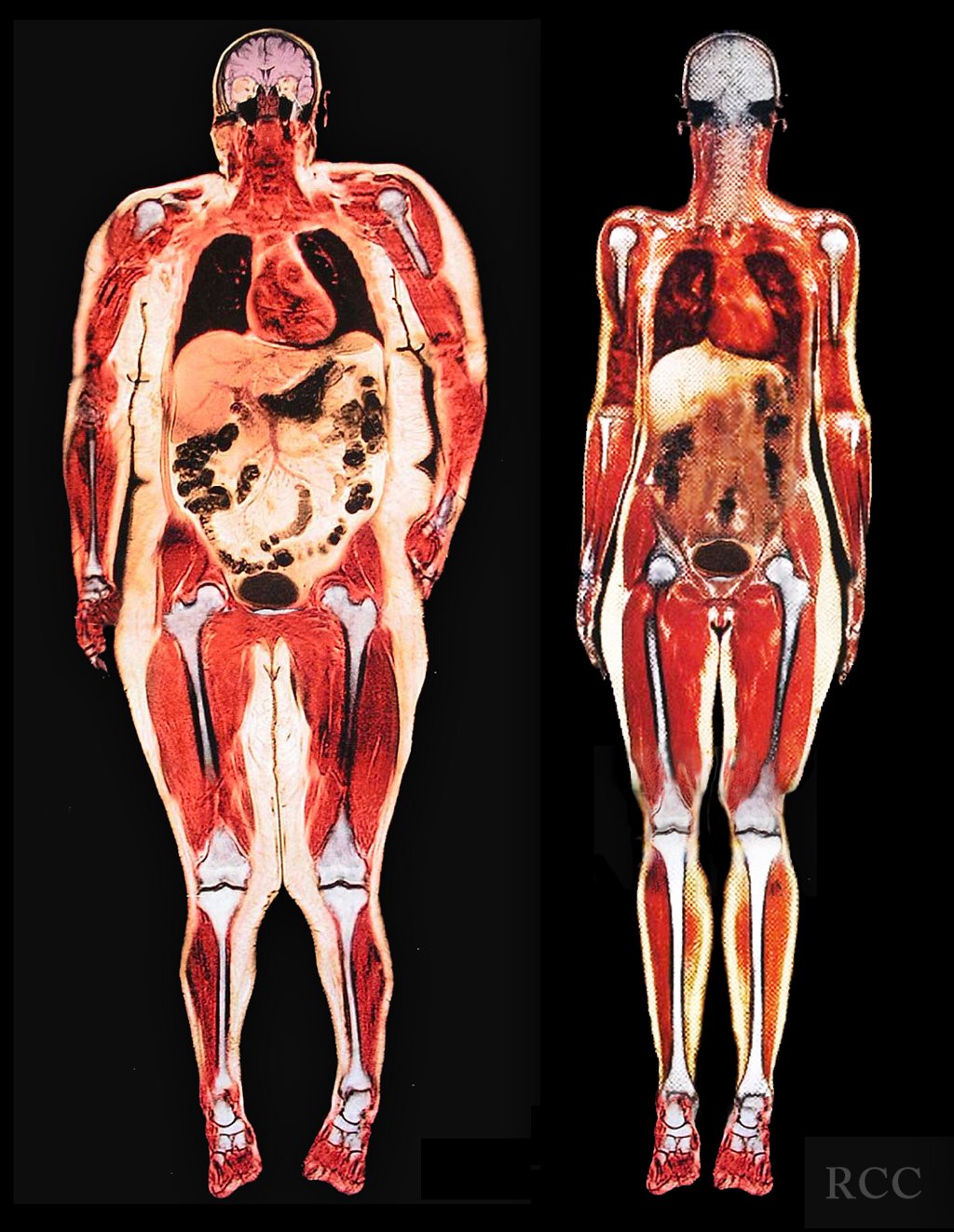
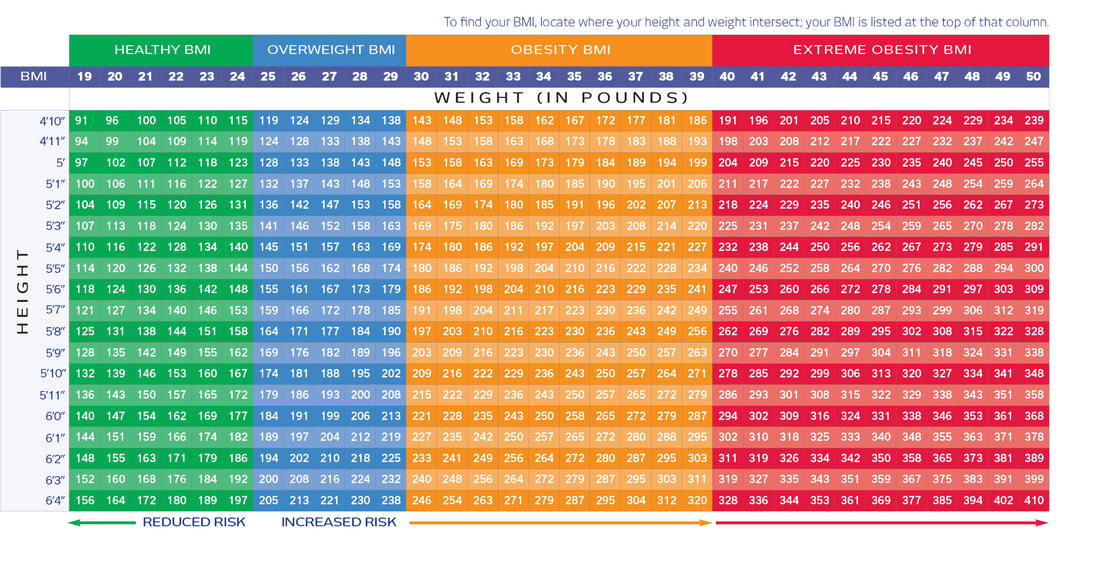
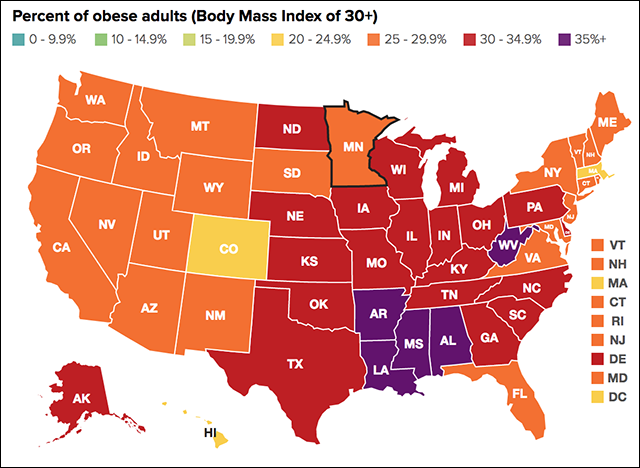
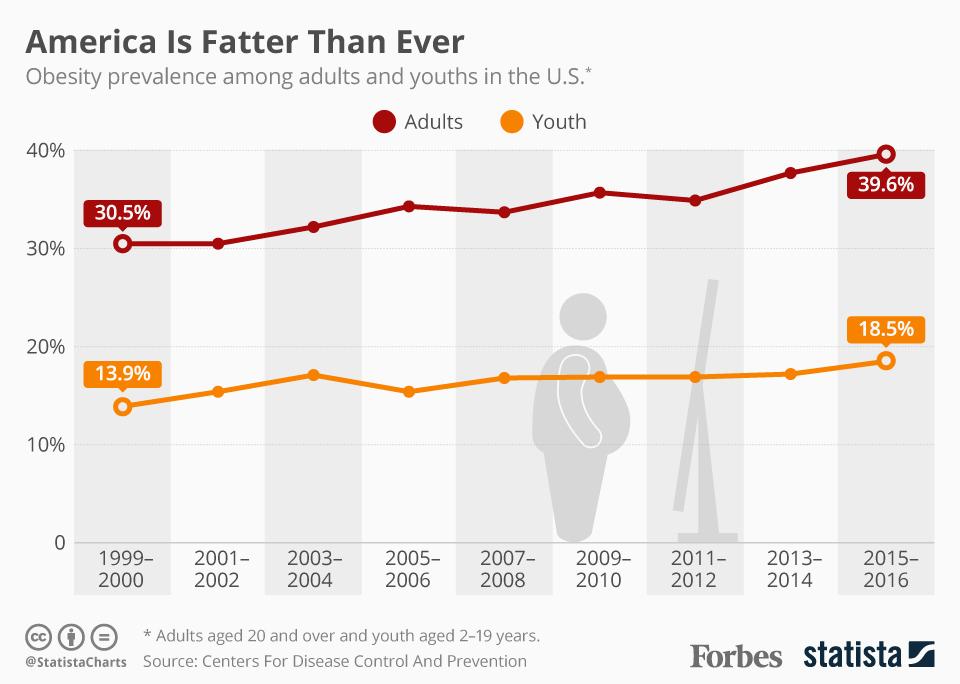

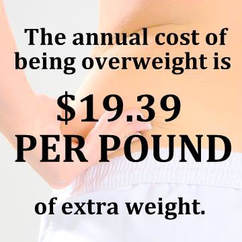
 RSS Feed
RSS Feed